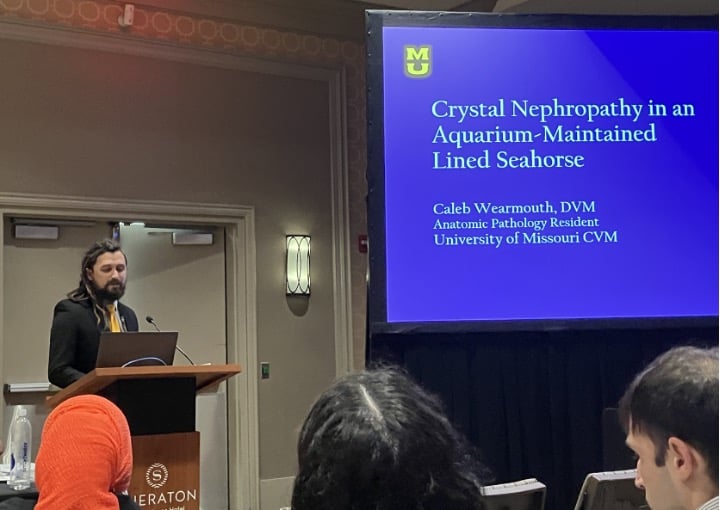

Dr. Susan Moore Speaks at the Rabies in the Americas Conference
Dr. Susan Moore represented the CVM October 19th- 24th at the Rabies in the Americas conference in Lima, Peru. Her talk focused on finding practical, alternative ways to gather rabies testing data in under-resourced, high-risk areas — work that supports stronger vaccination programs and saves lives around the world.

VMDL Pathologists and Residents Showcase Strong Anatomic Pathology Program at Annual ACVP Meeting
The VMDL anatomic pathology team made a strong impression at this year’s meeting, and we are proud to share their outstanding contributions—a true testament to VMDL’s diagnostic expertise, scholarly activity, and residency training program.
- Dr. Alexis Carpenter, who became a new Diplomate of ACVP in 2025, presented her diagnostic case (podium, co-authored by Dr. Dae Young Kim), “Uterine Choriocarcinoma in a Dog,” featuring an excellent immunohistochemical investigation characterizing this rare lesion. Dr. Carpenter also received the Davis-Thompson Foundation Pathology Trainee and Scholarship Award.
- Dr. Caleb Wearmouth presented his diagnostic case (podium, co-authored by Dr. Dae Young Kim), “Crystal Nephropathy in an Aquarium-Maintained Lined Seahorse,” which sparked engaging discussions on this fascinating case.
- Dr. Stephanie Anderson presented her diagnostic case (poster, co-authored by Dr. Kei Kuroki), “Mast cell tumor in a pet Cairo spiny mouse,” providing valuable clinicopathologic insights into this uncommon neoplasm in pet rodents.
- Dr. Kei Kuroki presented a retrospective study of 120 canine stifle biopsies (poster) and co-authored a project on newly identified canine systemic amyloidosis (3rd place award), a collaboration with Dr. Natsumi Kobayashi (Tokyo University of Agriculture and Technology) developed during her externship at VMDL.
Congratulations Anatomic Pathology Team!

MU VMDL Closed for Veterans Day 2025
The University of Missouri is observing Veterans Day 2025 as a public holiday for all employees. Accordingly, the MU VMDL will be closed on Tuesday November 11th, 2025.
Please consider holding perishable samples and understand that holidays are not included in VMDL turnaround time estimates.
Arrangements to drop off animals for necropsy can be made with the on-call student by calling 573-864-7160.
An update on bovine theileriosis
You’ve probably heard about the longhorned tick (Haemaphysalis longicornis). This invasive species transmits Theileria orientalis, a protozoal organism that infects bovine red blood cells and causes a hemolytic anemia similar to bovine anaplasmosis.
Native to eastern Asia, the longhorned tick was first recognized in the U.S. in 2017 and has since been confirmed in 24 states. It was first detected in Greene County, Missouri in June 2021 and has since been reported from a total of 8 counties in our state. It’s very likely that the ticks are in other counties but haven’t been recognized yet.
Invasive populations of longhorned ticks are composed almost entirely of asexually reproducing (parthenogenetic) females, allowing a single viable female to establish a new population. Computer models predict that extensive swaths of the U.S. and Mexico are suitable habitats for the tick. Longhorned ticks feed on a wide variety of domestic and wild animals, including birds, which contributes to their adaptability.
Theileria orientalis has 3 predominant genotypes: Ikeda, Chitose, and Buffeli. The Ikeda genotype is the most virulent, causing severe illness and death in up to 5% of infected cattle. Ikeda was first recognized in the U.S. in 2017, in a Virginia beef herd. The illness was initially suspected to be anaplasmosis, but subsequent investigation by the local vet, state veterinary officials, and the U.S. Department of Agriculture identified T. orientalis Ikeda and also found longhorned ticks on the cattle.
Sporadic cases of theileriosis have been detected in Missouri since June 2023. In 2024, a surveillance study conducted by Dr. Ierardi with colleagues from the VMDL, Veterinary Teaching Hospital, and MU Extension documented T. orientalis Chitose and Ikeda genotypes in 7.5% of 147 cattle tested from three cow-calf operations in central and north-central Missouri.
No treatment is currently available, but many infected cattle will recover and remain productive. Cases are reported to the Missouri Department of Agriculture to monitor disease trends, but theileriosis is not federally reportable and does not trigger any official action such as quarantine.
The VMDL offers a fully validated T. orientalis PCR, which detects all of the clinically relevant genotypes. This can be requested as a stand-alone test (Theileria orientalis qPCR, $44) or in combination with Anaplasma marginale PCR (Bovine Tick Panel, $59). Optimal sample types are EDTA-anticoagulated whole blood or fresh spleen.
Additionally, our board-certified clinical pathologists are skilled in the recognition of Theileria organisms on blood smears (Blood Parasite Exam, $25; Blood Smear Exam, Comprehensive, $48). It’s important to note that while blood smears are very useful in the workup of individual sick cattle, they are not sensitive as a herd-level screening test.
If you’re not sure which test option and/or sample type best suits your needs, VMDL faculty and staff are happy to assist at 573-882-6811.
